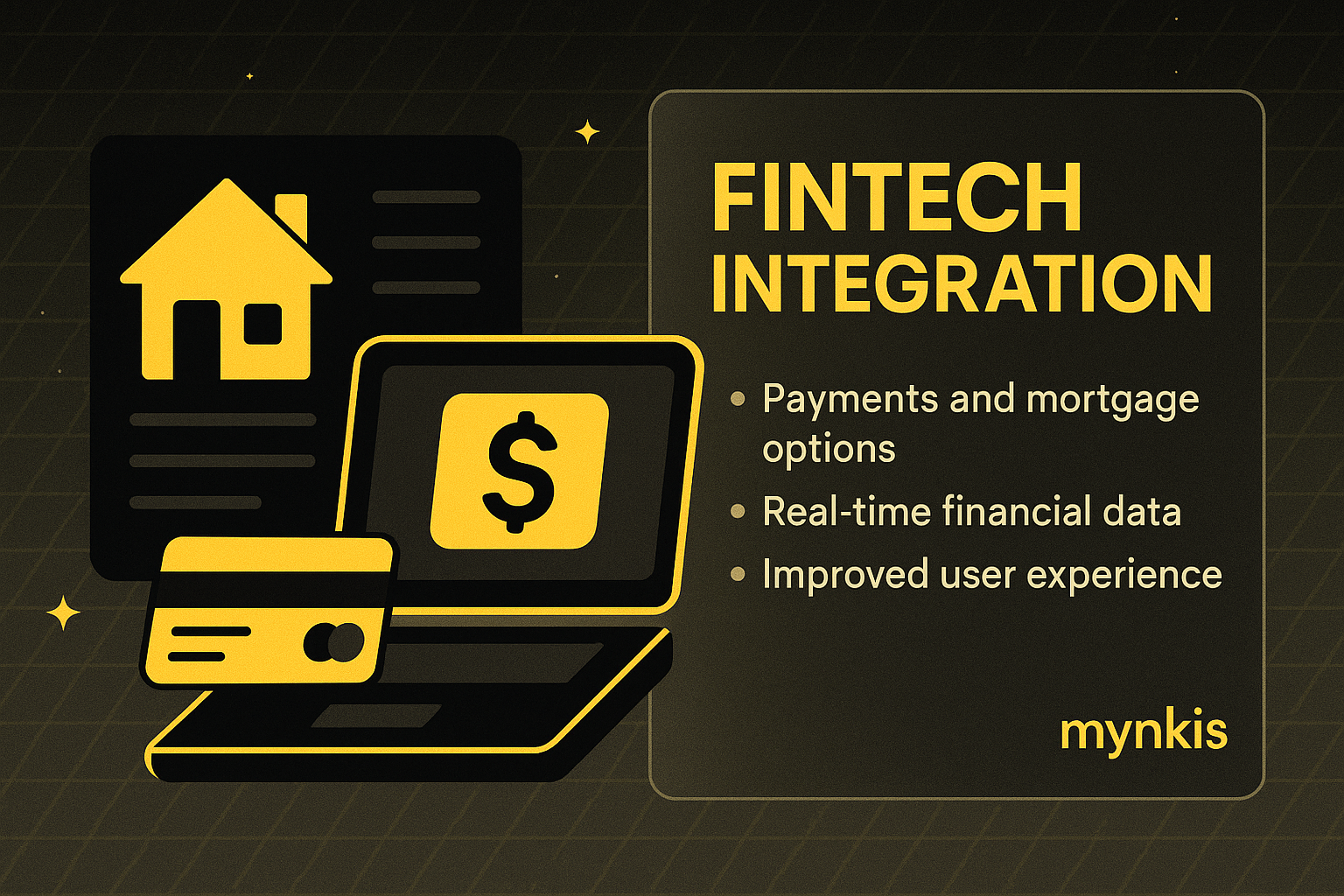Schedule a Demo
In the dynamic world of real estate brokerage, incorporating fintech solutions into your property listing platform isn't just about adding tech—it's about revolutionizing the way you conduct business. Imagine being able to offer your clients a comprehensive digital experience that combines seamless website navigation with robust financial services. This is the value strategic fintech integration brings to your table. By embedding fintech features directly into your listing sites, you're not only enhancing user experience but also boosting your site's search engine optimization (SEO) rankings for local queries, which can directly impact your business's bottom line.
Through my years working with various brokerage firms, I've seen first hand how personalized fintech tools can radically improve client interactions. When users land on a listing site, they expect not just to browse properties but to engage with tools that cater specifically to their financial needs. Integrating features like mortgage calculators, affordability checkers, or instant pre-approvals from lenders directly into your website creates a one-stop-shop experience. This approach keeps users engaged longer, which benefits not only your clients but also enhances your SEO metrics like dwell time and pageviews.
Effective use of fintech integration goes beyond mere functionality; it taps directly into your website's SEO strategy. When you incorporate these tools, you're inviting users to spend more time on your site. For instance, a mortgage calculator on your property listing pages encourages users to interact, input data, and stay on the page longer. This user engagement signals to search engines like Google that your site provides value, improving its ranking for relevant local queries.
Implementing fintech features can take your site from a static collection of listings to a dynamic property marketplace. Here’s how you can do it:
Nowadays, many potential clients access real estate sites from their smartphones, making mobile optimization crucial. Fintech apps that integrate with your site must be responsive and fast. Ensure that any fintech feature, such as loan applications or payment processing, functions seamlessly on mobile devices. Mobile-friendly design not only improves user satisfaction but also aligns with Google's mobile-first indexing approach, further boosting your site's SEO rankings.
By integrating fintech apps, you'll have access to valuable data about user behavior that can drive smarter SEO strategies. User interaction with fintech tools such as mortgage calculators generates rich data points on which properties they are most interested in or what price points they are looking at. This data can be used to refine your SEO keywords, tailor your content, and create more targeted marketing campaigns, further enhancing your site's visibility.
Fintech integration isn't a one-size-fits-all solution. In my consultations with brokerage clients, I emphasize the importance of mapping out the user journey and customizing fintech features accordingly. For example, a user browsing entry-level condos might appreciate a simple rental affordability calculator, while a buyer in the luxury market could benefit from advanced financing options. By aligning fintech tools with specific user segments, you create a tailored experience that reflects well on user engagement metrics crucial for SEO.
Security is paramount when integrating fintech apps into your real estate listing site. Potential clients need to trust that their financial information is safe. Therefore, ensure that all fintech integrations comply with industry standards such as GDPR or PCI DSS. Highlighting your security measures transparently can also improve your brand's trustworthiness, positively affecting SEO as users are more likely to recommend secure sites.
Utilizing AI-driven tools within your fintech integrations can offer an additional layer of personalization and efficiency. Features like automated property matches based on user finances or AI-assisted budgeting tools can dramatically enhance user satisfaction and engagement. This personalized approach not only enhances the user experience but also contributes to better SEO by increasing the relevance and engagement of your site's content.
The impact of fintech integration on your site's SEO performance should be meticulously monitored. Use analytics tools to track changes in your site's ranking, especially for local real estate keywords, after implementing these features. Based on available research, individual results may vary, but most real estate sites report an improvement in engagement metrics post-fintech integration.
As we look to the future, the intersection of fintech and real estate is poised for further growth. Trends such as decentralized finance (DeFi) or tokenization of property assets are on the horizon. Staying informed about these trends will allow you to stay ahead of the competition, potentially positioning your listing site as a leader in innovation.
Building strategic partnerships with fintech companies can elevate your offering. According to McKinsey, collaborations between real estate and fintech sectors are flourishing due to mutual benefits. When selecting a fintech partner, look for those who align with your business goals and have a track record of enhancing digital real estate solutions.
Above all, integrating fintech shouldn't detract from the core user experience of your site. In my work with operations managers in the real estate sector, ensuring that any new technological integration maintains, or better yet, enhances user ease of use has been a priority. The seamless blend of real estate services with fintech functionalities must feel intuitive and value-adding to your audience.
The field of fintech in real estate is ever-evolving, and what works today might need tweaking tomorrow. Keep an open dialogue with your users to understand what fintech features they appreciate or want more of. Regularly updating your fintech integrations and actively soliciting feedback can help maintain your site's relevance and SEO strength.
